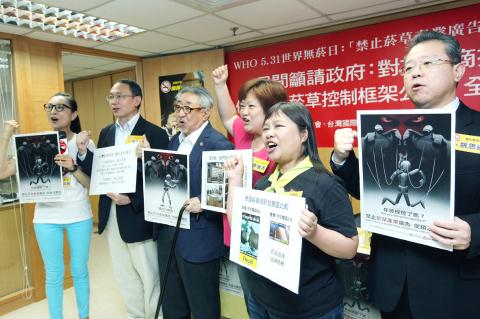The government should overhaul the Tobacco Hazards Prevention Act (菸害防制法) in accordance with the WHO Framework Convention of Tobacco Control and ban all tobacco advertising, promotion and sponsorship ahead of World No Tobacco Day on Friday, anti-smoking groups said yesterday.
The groups said the government has not done enough to tackle the country’s high cigarette consumption, especially among teenagers. They said that merely increasing the health and welfare surcharge on tobacco products, as stipulated by a recent amendment to the act, was not the right strategy.
The groups included the John Tung Foundation, the Homemakers United Foundation, the National Federation of Teachers Unions and the Taiwan International Medical Alliance

Photo: CNA
“The recent amendment to the act has implemented a higher tobacco surcharge, but smoking prevention is not just about taxing consumption,” John Tung Foundation chief executive officer Yau Sea-wain (姚思遠) said.
He added that the tobacco industry should be the main target of government prevention measures, particularly by implementing policies to rein in the industry’s marketing tactics.
National Federation of Teachers Unions secretary-general Lee Ya-ching (李雅菁) said that health warnings on cigarette packaging in Taiwan are the smallest and most moderate among the 63 countries that display such warnings, occupying only 35 percent of packaging.
“Public displays of tobacco products should also be banned,” Lee said. “Taiwan has more than 10,000 convenience stores that are open 24 hours a day, all with a wall displaying colorful cigarette packs behind the cashier. These displays are implicitly inciting young people to consume the products as smokers do not need the display to determine what they need.”
Homemakers United Foundation chairperson Chen Man-li (陳曼麗) said that while the smoking rate among adults decreased from 20 percent in 2009 to 9.1 percent in 2011 — after smoking bans in indoor public spaces and workplaces were implemented and the tobacco tax raised by 10 percent — total cigarette consumption increased from 2.018 billion packs to 2.022 billion in the same period.
“Who consumed the extra cigarettes?” Chen asked, saying it was teenagers who accounted for the rise in consumption, as smoking rates in that age group remained relatively unchanged during the two-year period.
Taiwan International Medical Alliance secretary-general Huang Song-lih (黃嵩立) said tobacco advertising and promotion has not been effectively regulated.
“The packaging itself is a type of advertisement,” said Huang, urging the government to introduce tougher packaging regulations and ban tobacco sponsorship to curb tobacco industry lobbying.

Chinese spouse and influencer Guan Guan’s (關關) residency permit has been revoked for repeatedly posting pro-China videos that threaten national security, the National Immigration Agency confirmed today. Guan Guan has said many controversial statements in her videos posted to Douyin (抖音), including “the red flag will soon be painted all over Taiwan” and “Taiwan is an inseparable part of China,” and expressing hope for expedited reunification. The agency last year received multiple reports alleging that Guan Guan had advocated for armed reunification. After verifying the reports, the agency last month issued a notice requiring her to appear and explain her actions. Guan

GIVE AND TAKE: Blood demand continues to rise each year, while fewer young donors are available due to the nation’s falling birthrate, a doctor said Blood donors can redeem points earned from donations to obtain limited edition Formosan black bear travel mugs, the Kaohsiung Blood Center said yesterday, as it announced a goal of stocking 20,000 units of blood prior to the Lunar New Year. The last month of the lunar year is National Blood Donation Month, when local centers seek to stockpile blood for use during the Lunar New Year holiday. The blood demand in southern Taiwan — including Tainan and Kaohsiung, as well as Chiayi, Pingtung, Penghu and Taitung counties — is about 2,000 units per day, the center said. The donation campaign aims to boost

The Kaohsiung Tourism Bureau audited six hotels in an effort to prevent price gouging ahead of Korean band BTS’ concert tour in the city scheduled for Nov. 19, 21 and 22 this year. The bureau on Friday said that the audits — conducted in response to allegations of unfair pricing posted on social media — found no wrongdoing. These establishments included the local branches of Chateau de Chine, Hotel Nikko, My Humble House, and Grand Hai Lai, it said, adding that the Consumer Protection Commission would have penalized price gougers had the accusations been substantiated. The bureau said the Tourism Development Act

The Central Weather Administration (CWA) said a magnitude 4.9 earthquake that struck off the coast of eastern Taiwan yesterday was an independent event and part of a stress-adjustment process. The earthquake occurred at 4:47pm, with its epicenter at sea about 45.4km south of Yilan County Hall at a depth of 5.9km, the CWA said. The quake's intensity, which gauges the actual effects of a temblor, was highest in several townships in Yilan and neighboring Hualien County, where it measured 4 on Taiwan's seven-tier intensity scale, the CWA said. Lin Po-yu (林柏佑), a division chief at the CWA's Seismological Center, told a news conference